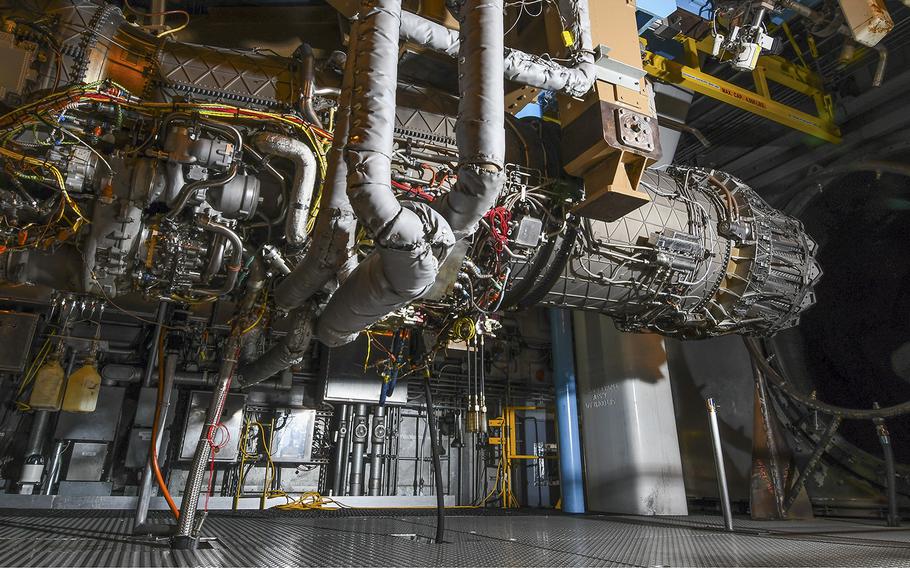
A Pratt & Whitney F135 engine undergoes accelerated mission testing in Sea Level Test Cell 3 at Arnold Air Force Base, Tenn., Nov. 15, 2021. The F135 is the engine used to power the F-35 Lightning II. (Jill Pickett/U.S. Air Force)
(Tribune News Service) — As one major airline’s CEO voiced hope that Pratt & Whitney’s woes won’t snowball further, the East Hartford manufacturer of jet engines produced only its second annual loss in more than a quarter century, as it picks up the tab for a labor-intensive fix.
The Federal Aviation Administration and counterparts globally ordered accelerated schedules to inspect and replace airplane engine parts, after the discovery of microscopic cracks in high-pressure turbine disks that included contaminated metal powders from a Pratt & Whitney facility in New York. The work requires removing each engine from its wing, disassembling it to install replacement parts, reassembling it and testing it.
Affected U.S. airlines with the jet engines include Delta, JetBlue, Spirit, Frontier Airlines and Hawaiian Airlines.
On any given day in the coming three years, as many as 350 aircraft could be grounded globally for that work, according to estimates published last October by Cirium Aviation Analytics.
The cost of the turbine disk recall swung Pratt & Whitney to a $1.46 billion operating loss last year, wiping out net earnings of $1.1 billion in 2022 and most of a $454 million profit in 2021, as airlines were recovering from the COVID-19 pandemic. Since 1998, Pratt & Whitney has generated profits in every year except 2023 and the pandemic year of 2020.
Pratt & Whitney is the second largest jet-engine maker in the world, after the CFM International joint venture between GE Aerospace and Safran. In addition to airlines, military aircraft manufacturers use Pratt & Whitney engines, including Lockheed Martin for the F-35 fighter jet and Northrop Grumman for the new B-21 Raider stealth bomber.
Pratt & Whitney shipped nearly 3,150 engines to customers last year, more than 2,000 from its Pratt & Whitney Canada operations in Quebec, which focuses on engines for smaller planes operated by regional airlines and other customers. In 2022, Pratt & Whitney produced just under 2,900 engines across its Canadian and U.S. plants.
Pratt & Whitney was sued last year by an India-based airline that claims it was forced into bankruptcy after grounding its fleet over the turbine disk issue. Chris Calio, president of RTX who formerly led Pratt & Whitney, did not say if the company expects additional litigation by airlines over lost revenue as planes get taken offline ahead of their normal schedules for the fixes, after getting asked the question during a Tuesday conference call.
“We are engaging with our customers each and every day to try to figure out how best to support them, whether that’s through induction, whether that’s through special support, whether that’s the spare engine allocation — whatever it may be,” Calio said Tuesday. “Working very hard with them to come up with a compensation structure relative to the powdered metal, (grounded aircraft) situation. That’s fair, and that can give them a little bit of lift. Obviously, it won’t make up for all of the disruption that they’re having in their fleet and all of the things that they’ve got to do to accommodate for these removals.
“Obviously, we don’t want to be in a position where we’re putting our customers in harm’s way and where they’re going to be very upset with us and want to take action,” Calio continued. “But I’ll tell you, we’ve got a track record of coming to agreement with our customers on some of the more difficult problems we’ve faced. I’m confident we’re going to be able to do it again.”
Calio is getting promoted to CEO this year with the planned retirement of Greg Hayes, who led United Technologies’ 2020 merger with Massachusetts-based Raytheon to form RTX, ultimately relocating the combined company’s headquarters to McLean, Va. In addition to Raytheon and Pratt & Whitney, RTX owns Collins Aerospace, which is a major aerospace employer in the Hartford area.
Delta Airlines addressed the Pratt & Whitney engine issue two weeks ago, with the carrier currently being impacted as well by the FAA’s grounding of Boeing 737 MAX 9 jets for inspections after a door plug blew out mid-flight this month on an Alaska Airlines plane.
“I hope there’s no more surprises — but I’d be lying to you if I thought that’s the case,” said Delta CEO Ed Bastian, during a conference call in mid-January. “The MAX 9 issue is a one-off, a separate issue, I’m not referring to that. I am referring principally to the engine side of the business, and there’s a lot of work on Pratt. We have a lot of reliance on Pratt, and the challenges that they’re facing have been well-chronicled.”
(c)2024 The Middletown Press, Conn.
Visit www.middletownpress.com
Distributed by Tribune Content Agency, LLC.